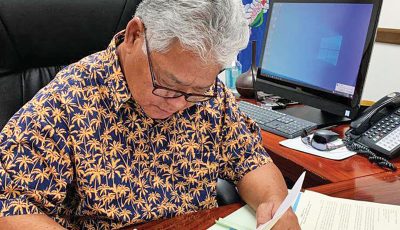Judiciary’s amended budget request seeks 10% pay raises
The CNMI Judiciary has submitted an amended fiscal year 2022 budget request in the amount of $12,851,685 that reflects, among others, a 10% salary increase across-the-board, with the exception of justices and judges.
In their amended budget request last month to Senate President Jude U. Hofschneider and House Speaker Edmund S. Villagomez, Supreme Court Chief Justice Alexandro C. Castro and Superior Court Presiding Judge Robert C. Naraja said the 10% salary increase adjustment became effective last June based on the availability of the American Rescue Plan Act funding.
Last March, the Judiciary asked the Legislature for a fiscal year 2022 budget of $11,832,100, which is approximately $7 million more than what is currently allocated to the Judiciary.
Early this month, the House passed the budget bill for fiscal year 2022 that allocates $1,227,664 to the Judiciary, $3,384,543 to the Legislature, and $25,282,849 to the Executive Branch. The bills is now before the Senate for action.
In their amended budget request, a copy of which Saipan Tribune obtained Tuesday, Castro and Naraja said Gov. Ralph DLG Torres has committed $13,106,703 of the ARPA funds for operations and activities of the Judiciary in fiscal years 2021-2023. They said Torres and Lt. Gov. Arnold I. Palacios solidified this commitment in writing on June 4, 2021, at the ARPA CNMI expenditure plan presentation.
Castro and Naraja said various factors necessitated their request for salary adjustment. In previous years, they said, salaries have remained stagnant, leading to difficulties in hiring and retaining employees. They said employee turnover is costly as the Judiciary incurs additional costs to recruit and train new hires.
“Turnover also results in decreased productivity and less institutional knowledge,” they said.
The Judiciary had proposed across-the-board salary adjustments in prior budget requests, but they were not granted due to the fiscal climate of the CNMI, in part, caused by the COVID-19 pandemic and its effects on government revenues.
Castro and Naraja said modifications in the compensation plan will allow the government to offer competitive compensation, as well as incentivize unemployed individuals to rejoin the workforce.
They said the submission includes employees costs for the new Mental Health Docket, which is scheduled to go live this summer.
Castro and Naraja said the need to establish a mental health docket has been on the Judiciary’s roadmap for quite some time. They said the urgency to implement one, however, became compelling in the wake of the pandemic, after having observed an uptick in cases involving individuals with mental health issues.
They said the mental health docket is designed to provide participants intensive supervision by using problem-solving and non-adversarial models, connecting them to a variety of rehabilitative services and support networks for enhanced quality of life and to reduce recidivism.
The CNMI Supreme Court established the Mental Health Court Docket last July 3.


























